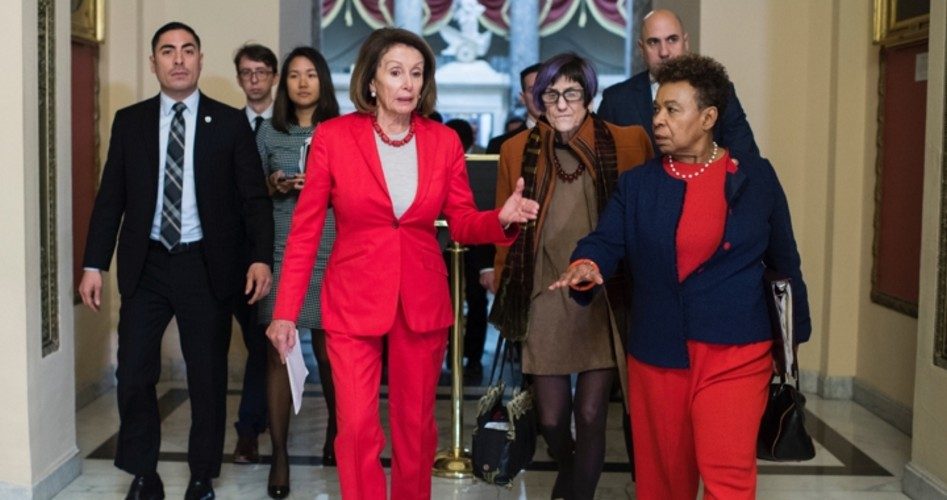
House Speaker Nancy Pelosi is opting to play political hardball with President Donald Trump in their dispute over whether to fund his border wall and the subsequent government shutdown. Wednesday, she sent a letter to Trump asserting that his scheduled January 29 “State of the Union” message be delayed due to what she called “security concerns.”
Or, Pelosi suggested, he could just send his planned speech up Pennsylvania Avenue “in writing.”
Pelosi argued in her letter to Trump that, owing to the government shutdown, employees of the Secret Service and the Department of Homeland Security — who have not been paid in nearly a month — would not be able to provide the security necessary for a presidential address to a joint session of Congress.
“The U.S. Secret Service was designated as the lead federal agency responsible for coordinating, planning, exercising, and implementing security for National Special Security Events by Public Law 106-544, December 19, 2000,” Pelosi said in her letter. “However, both the U.S. Secret Service and the Department of Homeland Security have not been funded for 26 days now — with critical departments hamstrung by furloughs.”
“Sadly,” Pelosi continued, “given the security concerns and unless government re-opens this week, I suggest that we work together to determine another suitable date after government has re-opened for this address or for you to consider delivering your State of the Union address in writing.”
Both the Secret Service and the Department of Homeland Security (DHS) disputed Pelosi’s assertion that they would be unable to provide security for the event, arguing that they had been planning the event for months, as is their standard procedure. Neither agency was consulted by Pelosi before she told Trump that he needed to delay his address. DHS Secretary Kirstjen Nielsen insisted that both agencies “are fully prepared to support and secure the State of the Union.”
The Constitution, in Article II, Section 2 states, “He [the president] shall from time to time give to the Congress information of the State of the Union, and recommend to their consideration such measures as he shall judge necessary and expedient.” While nothing is said about the president delivering a “State of the Union Address” in person, the first president, George Washington, did so in 1790. The third president, Thomas Jefferson, opted to just send his message to Congress in writing, arguing that an in-person annual message smacked of monarchy.
This was the practice until President Woodrow Wilson. In 1913, Wilson, a “progressive” who believed the president should take more of a lead in the American political system, gave the State of the Union Address to a joint session of Congress. Every president since has followed Wilson’s practice. With the dawn of radio, and especially television, no president is going to pass up the opportunity to go on radio and TV, complete with the stage of a House chamber packed with the membership of both houses of Congress, the Cabinet officers, the top military officers of the nation, and members of the Supreme Court.
Because of the obvious security concerns of having the entire American government in one place, at one time, the law stipulates that one member of the president’s cabinet be absent, at an undisclosed location, ready to carry on should the rest of the government be wiped out in some way.
This is the security concern cited by Pelosi, but most observers understand that it is actually politics that precipitated her letter to Trump, not concern that the Secret Service and DHS could not protect the assembled members of the American government. Marc Short, a former legislative affairs director for Trump, said, “It’s a bogus claim to say there are security concerns. Everybody can look at that and say she doesn’t want to give the president a platform to speak to the nation about border security.”
House Minority Whip Steve Scalise (R-La.) bluntly said that Pelosi is “holding the State of the Union message hostage.” Even a Democrat member of the Senate, Joe Manchin of West Virginia, responded, “I think this is a wrong approach to be taking.”
There were varied opinions as to how best to respond to Pelosi’s political ploy. Senator Rand Paul (R-Ky.) suggested moving the speech to the Senate chamber and inviting members of the House to cross the rotunda, if they wish.
But Representative Max Rose, a New York Democrat elected last fall after running as a centrist who did not support Pelosi, thinks Pelosi may have made a mistake by essentially disinviting Trump. “She’s bailing the president out, man. Do you think the president of the United States is going to deliver a State of the Union during a government shutdown and say it’s good?”
In fact, it has been reported that House Democrats had been planning on making the State of the Union message an anti-Trump spectacle, intending to showcase some federal workers, and performing disrespectful stunts like turning their backs on Trump during his speech. Of course, such juvenile antics could wind up shifting some public opinion away from the Democrats and toward Trump.
While Pelosi’s power play is certainly denying Trump the TV stage to rally the country to his side, it does make her more of the face of the anti-Trump opposition, and her poll numbers are lower than Trump’s. Republican strategists could divert attention away from Trump by focusing on her, causing House Democrats to be tarred with the same brush as she.
Photo: AP Images

